4th grade writing
by: Jessica Kelmon | Updated: September 25, 2024
Print article

In fourth grade, study skills play an important role in your child’s writing. Kids do research using multiple sources. They also learn to take notes on what they research, read. and hear. And even stories are more advanced, with more developed characters who show their feelings and react to what happens. And perhaps most important, your child is expected to analyze a book’s structure, logic, details, and evidence in their writing. It’s all pretty impressive!

Building 4th grade study skills
This year taking notes is an important skill. Fourth graders are expected to use books, periodicals, websites, and other digital sources to conduct research projects — both on their own and as part of group work with peers. Your child should keep track of all the sources they check — noting what they learn, the name of the source and page number or url so they can find it again and create a source list or bibliography later.
Also, taking notes while reading fiction will help your child when it comes time to analyze what they’ve read or to give an in-depth description of a character, setting, or story event drawing on specific details.
Check out this related worksheet: • Finding key points
bttr, better, best!
Last year’s prewriting step — planning — becomes more essential in your child’s writing process this year. Before your child sits down to write, they should use their organized notes to help create the structure of whatever they’re writing. While planning , your child may brainstorm ideas for a story or decide how to organize facts into a cohesive set of points. The more knowledge your child builds during the prewriting stage, the easier it will be to write. Encourage reading and rereading, taking notes, finding additional sources, discussing aloud how new knowledge fits in with what your child knew before, and visually organizing what they plan to write about. After the first draft is written, the teacher and possibly other students will offer feedback: asking questions to elicit new details or clarify an argument or suggest new sources of information. They should check that there’s a clear introduction and conclusion, and that the order of points or events makes sense. Your child will then do a revision (or two), adding, reordering, and refining their writing to show deep understanding.
After making revisions, your child does a final edit focusing on spelling, grammar, punctuation, and strengthening word choices. These steps — planning, writing a first draft, revising, and editing the final piece — help fourth graders understand that research, organizing, clarifying ideas, and improving grammar and presentation are all essential to strong writing.
See what your fourth grade writing looks like

Fourth grade writing: opinion pieces
Your child’s opinions always need to be supported by evidence. Persuasive writing should start by clearly introducing an opinion on a topic. To support their opinion, kids need to present their argument, which is a list of reasons why they hold that opinion. Each of their reasons needs to be supported by facts and details (a.k.a. evidence). After presenting all of their research-supported reasons, kids should close their arguments with a concluding statement or paragraph that sums up how their evidence supports their opinion.
Check out this example of good fourth grade opinion writing: • “ Zoos should close ”
Fourth grade writing: informative writing
This year, your child’s informative writing gets more organized, with headers, illustrations and even multimedia components to support specific points. To begin, your child should introduce the topic. Then they should use facts, definitions, details, quotes, examples, and other information to develop their topic into a few clear, well thought-out paragraphs. Your fourth grader should use advanced linking words (e.g. also, another, for example, because ) to form compound and complex sentences connecting their research and ideas to the point they’re making. Finally, to wrap it up, your child should have a conclusion — either a statement or, if necessary, a section labeled conclusion.
Check out these three examples of good fourth grade informational writing: • “ John Cabot and the Rediscovery of North America ” • “ Big Book of Evolution ” • “ Book report: A Tale of Despereaux ”
Can your fourth grader write an informational essay?

Fourth grade writing: narratives
A narrative means writing a story. This year your child will be expected to use storytelling techniques, descriptive details, and clear sequences to tell compelling tales. Whether inspired by a favorite book, real events, or your child’s imagination, your child’s story should use dialogue, descriptive words, and transitional language. Look for precise language and sensory details that bring characters to life. Finally, your child should keep pacing and sequence of events in mind. The events should unfold naturally, bringing the story to a natural conclusion. Are surprise endings okay? Sure… so long as the details and events plausibly lead there.
Check out this related worksheet: • Putting sentences in order
Gettin’ good at grammar
You may want to review all those parts of speech your child learned last year because fourth grade grammar is expected to be quite accurate. Your child should know relative pronouns (e.g. who, whose, whom, which, that ), relative adverbs (e.g. where, when, why ), adjective ordering (e.g. short dark hair and small red bag ), descriptive prepositional phrases (e.g. in the air, down the block, on the grass ), progressive past, present, and future verbs (e.g. I was walking, I am walking, I will be walking ), and verbs used with other verbs to express mood or tense (aka modal auxiliaries, e.g. can, may, must, should, would ). Also, your child needs to master the distinctions between frequently confused words like to , too , and two and there , their , and they’re . Finally, your child should be able to recognize and correct run-on sentences.
Check out these related worksheets: • Prepositions • Compound sentences • Punctuating a paragraph • Its or it’s?
Learning to use language precisely
This means:
- Recognizing and explaining common idioms (e.g. bending over backwards )
- Distinguishing between similes and metaphors (e.g. quiet as a mouse and the sun is a yellow beach ball ).
- Identifying and using synonyms and antonyms
- Using increasingly specific words in writing (e.g. glamorous instead of pretty, pre-dawn instead of morning, quizzed instead of asked )
Your fourth grader should now be using relevant academic words in informational writing and research reports. Although accurate spelling should be the norm in fourth grade, when faced with spelling more academic words, your child should use a dictionary and thesaurus (print and digital versions).
Check out these related worksheets: • 4th grade weekly spelling lists • Making metaphors • Simile or cliché?
Sharing their work
Most classrooms will encourage (if not require) kids to use technology to produce and publish their writing. Your fourth grader should be able to type up to a full page in one sitting. While teachers should be there to help, your child should be doing the work. Students will also be expected to interact with peers about each other’s work. What might that look like? Your child might read a classmates’ published work online and comment on it, or cite a peer’s work when answering a question in class.
Updated August 2022

Homes Nearby
Homes for rent and sale near schools

6 ways to improve a college essay

Quick writing tips for every age

Writing on the wall
Why parents must teach writing
Yes! Sign me up for updates relevant to my child's grade.
Please enter a valid email address
Thank you for signing up!
Server Issue: Please try again later. Sorry for the inconvenience
How-To Writing: Motivating Students to Write for a Real Purpose

- Resources & Preparation
- Instructional Plan
- Related Resources
What do students need to know to succeed in fourth grade (or third or fifth)? What supplies are needed? What rules and steps should be followed? These and many other questions provide the framework for students to write how-to essays for a specific audience—future fourth graders. Although this lesson focuses specifically on fourth grade, it can be easily adapted for third or fifth graders. Students first learn about the how-to writing genre by reading an assortment of instruction manuals. This also demonstrates how how-to writing relates to their everyday lives. The teacher then models each step of the writing process as the students write about how to be successful fourth graders. After students publish their writing, the final drafts are saved for the following year's fourth graders to read at the beginning of the next school year.
Featured Resources
- Power Proofreading : Students can use this interactive site to complete activities to build their proofreading skills.
- Essay Map : Using this interactive site, students can organize the information they will include in their essay.
From Theory to Practice
- Students need to understand that there are purposes for writing other than for the teacher to read and grade it. Writing how-to essays has been found to be a successful alternative to the traditional research paper or teacher-based essay.
- How-to writing is a genre that appeals to most students because it is applicable in the world. This genre involves exploring interests and needs to identify a topic, conducting several research methods, and working through the writing process.
- When students' writing has an authentic audience beyond the classroom teacher, they can see a direct connection between their lives and their literacy development.
Common Core Standards
This resource has been aligned to the Common Core State Standards for states in which they have been adopted. If a state does not appear in the drop-down, CCSS alignments are forthcoming.
State Standards
This lesson has been aligned to standards in the following states. If a state does not appear in the drop-down, standard alignments are not currently available for that state.
NCTE/IRA National Standards for the English Language Arts
- 1. Students read a wide range of print and nonprint texts to build an understanding of texts, of themselves, and of the cultures of the United States and the world; to acquire new information; to respond to the needs and demands of society and the workplace; and for personal fulfillment. Among these texts are fiction and nonfiction, classic and contemporary works.
- 4. Students adjust their use of spoken, written, and visual language (e.g., conventions, style, vocabulary) to communicate effectively with a variety of audiences and for different purposes.
- 5. Students employ a wide range of strategies as they write and use different writing process elements appropriately to communicate with different audiences for a variety of purposes.
- 12. Students use spoken, written, and visual language to accomplish their own purposes (e.g., for learning, enjoyment, persuasion, and the exchange of information).
Materials and Technology
- Computer with Internet access and LCD projector
- Assortment of instruction manuals as examples of how-to writing
- Chart paper
- Overhead projector and transparencies
- How to Succeed in the Fourth Grade: Graphic Organizer
- How to Succeed in the Fourth Grade: Writing Rubric
- Correcting and Proofreading Checklist
Preparation
Student objectives.
Students will
- Recognize that how-to writing is a genre they encounter in their everyday lives
- Identify the characteristics of the how-to writing genre and incorporate them into a how-to essay about succeeding in the fourth grade
- Identify the audience for their how-to essay (i.e., future fourth graders) and shape the essay to appeal to this audience
- Apply the steps of the writing process to complete the how-to essay
Note: This prewriting activity allows students to work together to brainstorm ideas for their writing, but it also allows for each essay to be different, as students may choose different materials, rules, or steps for success in the fourth grade.
Students may choose a topic of interest to write another how-to essay. For example, students may choose to write instructions for how to play a board game or a sport that they enjoy.
Student Assessment / Reflections
Use the How-To Succeed in the Fourth Grade: Writing Rubric to assess students' writing.
- Strategy Guides
- Student Interactives
- Calendar Activities
This strategy guide explains the writing process and offers practical methods for applying it in your classroom to help students become proficient writers.
The Essay Map is an interactive graphic organizer that enables students to organize and outline their ideas for an informational, definitional, or descriptive essay.
Students examine the different ways that they write and think about the role writing plays in life.
Add new comment
- Print this resource
Explore Resources by Grade
- Kindergarten K

How to Improve Writing in Fourth Grade
Written by Dan
Last updated January 31, 2024
Improving fourth-grade writing skills is a crucial step in a student’s academic journey. Fourth-grade writing lays the foundation for more advanced writing skills that students need in higher grades and beyond.
However, many students may struggle with writing, and it’s up to teachers and parents to provide support and guidance to help them improve.
Related : For more, check out our article on How To Improve Writing In Second Grade here.

Understanding the basics of writing in fourth grade is the first step towards improving writing skills. Fourth-grade writing typically involves writing paragraphs with a clear topic sentence , supporting details, and a concluding sentence.
Students are also expected to use proper grammar, punctuation, and spelling. Additionally, students may be asked to write different types of texts , such as narratives, persuasive essays, and informative/explanatory texts. By understanding these basics, students can begin to develop their writing skills.
Developing writing skills requires practice and feedback. Teachers and parents can provide opportunities for students to write regularly, such as journaling or writing prompts.
They can also provide feedback on students’ writing, highlighting areas for improvement and suggestions for improving.
Technology can also be a helpful tool for supporting writing, such as using word processing software with spell and grammar-check features.
Table of Contents
Key Takeaways
- Understanding the basics of fourth-grade writing is essential for improving writing skills.
- Developing writing skills requires practice and feedback from teachers and parents.
- Using technology can be a helpful tool for supporting writing.
Related : For more, check out our article on How To Improve Writing In Fifth Grade here.
Understanding the Basics of Writing in Fourth Grade
The Structure of Writing
In fourth grade , students are expected to write in a structured manner. This means that they should have a clear introduction, body, and conclusion in their writing.
The introduction should grab the reader’s attention and provide background information. The body should include supporting details and evidence to support the main idea. The conclusion should summarize the main points and leave the reader with a lasting impression.
The Components of Writing
Several components make up good writing in fourth grade . These include sentence structure, paragraph structure, and the main idea. Students should be able to write clear and concise sentences that convey their ideas effectively.
They should also be able to organize their writing into paragraphs that flow logically and support the main idea. The main idea should be clear and well-supported by evidence.
Understanding the Writing Process
The writing process is an important part of fourth grade writing curriculum . Students should be familiar with the steps involved in planning, drafting, revising, and editing their writing.
Planning involves brainstorming ideas and creating an outline. Drafting involves putting those ideas into sentences and paragraphs.
Revising involves making changes to improve the writing, such as adding more details or rearranging sentences. Editing involves checking for spelling, grammar, and punctuation errors.
Overall, understanding the basics of writing in fourth grade is essential for success. Students can become confident and knowledgeable writers by mastering the structure of writing, the components of writing, and the writing process.
Related : For more, check out our article on How To Improve Writing In Sixth Grade here.
Developing Writing Skills
Writing is an essential life skill that students need to develop in fourth grade. It is a fundamental way of communicating ideas, thoughts, and feelings. Developing writing skills can be challenging, but students can improve their writing abilities with consistent practice.
Improving Spelling and Punctuation
Spelling and punctuation are critical components of writing. Students must learn to spell words correctly and use proper punctuation to effectively convey their ideas.
Teachers can help students improve their spelling and punctuation skills by providing spelling and grammar exercises focusing on common errors. They can also encourage students to proofread their work before submitting it.
Enhancing Language and Word Choice
Language and word choice are essential when it comes to writing. Students need to learn how to use language effectively to convey their ideas.
Teachers can help students enhance their language and word choice skills by providing vocabulary exercises and encouraging them to read widely. Reading helps students to understand how language works and how to use it effectively.

Building Narrative and Informative Writing Skills
Narrative and informative writing skills are crucial for students in fourth grade. Students need to learn how to write narratives that engage the reader and informative pieces that provide relevant information.
Teachers can help students build their narrative and informative writing skills by providing them with writing prompts and encouraging them to write regularly. Additionally, teachers can provide feedback on the student’s writing to help them improve their skills.
Developing writing skills is essential for students in fourth grade.
Teachers can help students improve their writing skills by focusing on spelling and punctuation, enhancing language and word choice, and building narrative and informative writing skills.
With practice and guidance, students can become confident writers who can communicate their ideas effectively.
Using Technology to Support Writing
Integrating Technology in the Writing Process
Fourth-grade students can use technology to support their writing by integrating it into their writing process. For example, they can draft and revise their writing using word processing software.
This can help them to edit their work more efficiently and make changes without having to rewrite the entire piece.
Additionally, students can use technology to brainstorm ideas, organize their thoughts, and create outlines. Mind mapping tools, such as MindMeister or Coggle, can help students to visually organize their ideas and create a clear structure for their writing.
Another way to integrate technology into the writing process is by using speech-to-text software. This can be particularly helpful for students who struggle with writing or have difficulty expressing their ideas in writing.
By using speech-to-text software, students can dictate their ideas and thoughts, which can then be transcribed into written text.
Online Resources for Writing
The internet provides a wealth of resources that can help students to improve their writing skills. For example, online writing prompts can be a great way to inspire students to write and to develop their creativity.
Websites such as Writing Prompts can provide a variety of prompts on different topics, which can help students to develop their writing skills and explore different genres.
Another online resource for writing is online writing communities. These communities provide a platform for students to share their writing and receive feedback from other writers.
This can be a great way for students to improve their writing skills and to connect with other writers who share their interests.
Finally, online writing tools can be a great way to improve writing skills. Grammarly, for example, is a popular tool that can help students to improve their grammar and spelling.
Hemingway Editor is another popular tool that can help students to improve their writing by highlighting areas that need improvement, such as sentence structure or word choice.
Overall, technology can be a powerful tool for improving writing skills in fourth-grade students. By integrating technology into the writing process and using online resources, students can develop their writing skills and become more confident writers.
The Role of Teachers and Parents in Supporting Writing
Writing is a crucial skill that students must develop from an early age. Students are expected to write more complex sentences and paragraphs as they enter fourth grade. Teachers and parents play a vital role in supporting students’ writing skills by providing feedback, encouragement, and resources.
Providing Support and Feedback
Teachers and parents can provide support and feedback to students to help them improve their writing skills. Teachers can provide students with writing prompts, graphic organizers, and sentence starters to help them get started.
They can also model the writing process by sharing their own writing and revising and editing it in front of the class.
Parents can also support their children’s writing by providing a quiet space for them to write and offering to read and provide feedback on their writing. Parents can also encourage their children to share their writing with family members and friends to build their confidence and receive additional feedback.
Encouraging Reading to Improve Writing
Reading is an essential component of improving writing skills. Teachers and parents can encourage students to read by providing them with various books and other reading materials.
Students who read regularly are exposed to a variety of writing styles, which can help them develop their own writing skills.
Parents can also read with their children and discuss the books they are reading. This can help students develop their comprehension skills and expose them to new vocabulary and writing styles.
Teachers can also incorporate reading into their writing instruction by having students analyze and respond to texts.
In conclusion, teachers and parents are critical in supporting students’ writing skills. Teachers and parents can help students develop the skills they need to become confident and proficient writers by providing support and feedback and encouraging reading.
Advanced Writing Techniques

Developing Research and Note Taking Skills
In fourth grade, students are expected to conduct research and use specific details to support their writing. To improve their research and note-taking skills, students can use tables and lists to organize their information.
Encourage students to take notes on essential facts and details, including the source of the information.
It’s important to teach students how to evaluate sources and determine which ones are reliable. Encourage students to use various sources, including books, articles, and websites. Teach them how to cite their sources properly using MLA or APA format.
Practicing Opinion Writing and Argumentation
Opinion writing and argumentation are essential skills for fourth graders to develop. Students should be encouraged to express their opinions clearly and provide reasons to support their arguments. They should also be taught how to anticipate and address counterarguments.
To practice opinion writing and argumentation, students can participate in class debates or write opinion pieces on current events. Please encourage them to use specific examples and facts to support their arguments.
Overall, by practicing these advanced writing techniques, fourth graders can improve their writing skills and become more confident and knowledgeable writers.
Related Posts

About The Author
I'm Dan Higgins, one of the faces behind The Teaching Couple. With 15 years in the education sector and a decade as a teacher, I've witnessed the highs and lows of school life. Over the years, my passion for supporting fellow teachers and making school more bearable has grown. The Teaching Couple is my platform to share strategies, tips, and insights from my journey. Together, we can shape a better school experience for all.

Join our email list to receive the latest updates.
Add your form here
Sarah's Writing Spot
9 Awesome Writing Tips for Essays in 4th-5th Grade
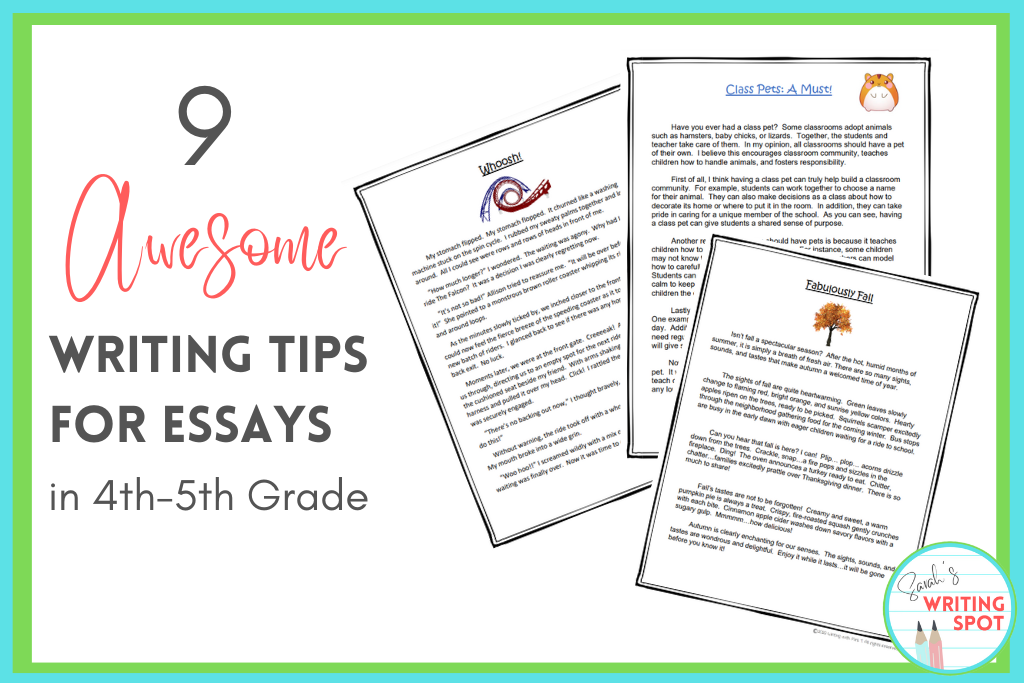
Looking for some handy writing tips for essays? You’ve come to the right place!
Teaching how to write an essay can sure feel daunting sometimes. Am I right? Where do you start? How do you ensure your students will create their best work? Let me help ease some of that stress by offering a few tips to navigate those choppy waters.
Before we dive deep, though, how cool would it be if you could continue learning new writing tips even after reading this blog? You could get tips (and even lessons!) straight to your inbox that are only a quick click away. Sharing ideas is what makes good teachers great. You deserve any shortcut that will fast-forward you to greatness!
Is Writing an Essay Hard?
Tap, tap, tap. I could hear a pencil tapping the desk and looked up. The pencil stopped. I’d just written a prompt on the board and was expecting to see my students busily writing away. Yet…my students’ pencils were still. Or tapping. I could hear sighing. I could see wiggly bodies shifting in their chairs. And then I realized: my students have no idea where to start. Sigh.
And whose fault was that? Mine.
You see, my young teacher-self thought (naively) that I could simply write a prompt on the board and my students would….well…write. But, as seasoned teachers have learned, it doesn’t necessarily work that way.
So, back to the heading of this section. Is writing an essay hard ? No! It doesn’t have to be! As long as you keep a few things in mind as you teach students how to write. (Things I wish I had known before I wrote that prompt on the board…)
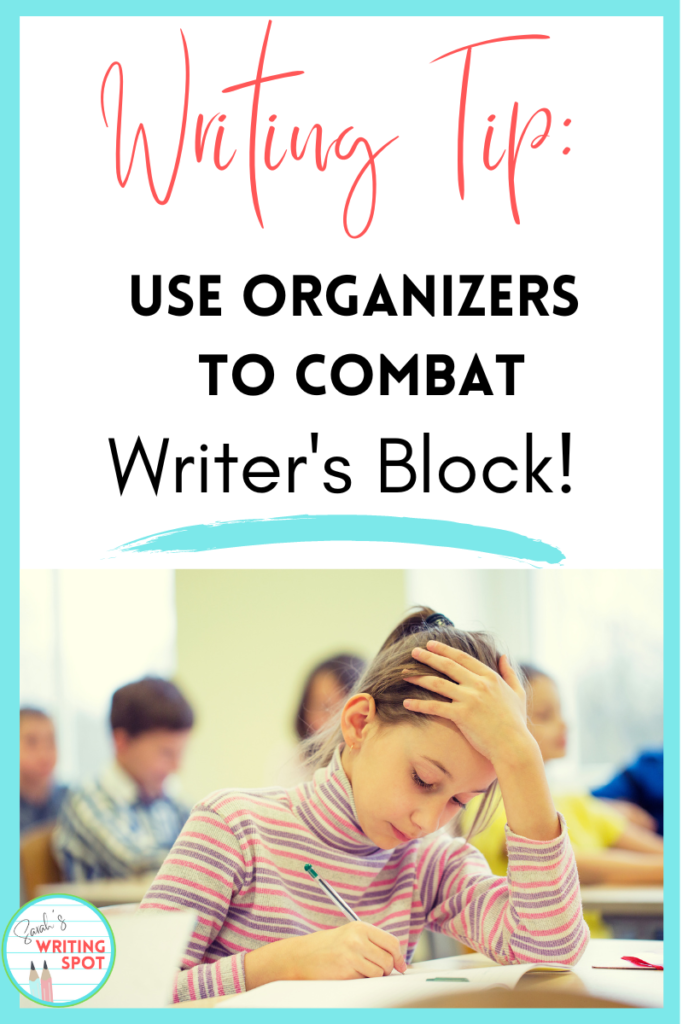
Tip #1: Don’t forget to teach about pre-writing!
Whether it’s a bubble graph, list, chart, or organizer, teach students how to brainstorm first. Instill in them that some type of planning needs to take place BEFORE the rough draft. Otherwise, they’ll be heading down the road to Writer’s Block City.
Tip #2: Break essay writing into small pieces.
The idea of writing a 5-paragraph essay is overwhelming for students. Show them that it doesn’t have to be written all in one sitting. (Rome wasn’t built in a day!)
Model how to bite off small chunks by committing to one paragraph at a time:
Monday : Introduction
Tuesday : Body Paragraph 1
Wednesday : Body Paragraph 2
Thursday : Body Paragraph 3
Friday : Closing
Teach Your Students How to Write Essays Better
Have you ever been sitting on your couch grading papers and thought defeatedly, “Why are these papers so flat? So lifeless? ” Have you ever wondered how to bring out your students’ voices in their writing?
Give these tips a try to teach your students how to write essays better:
Tip #3: Use an example before you start a writing unit.
Always, always, always share an example of a writing piece before you ask students to write their own. Teaching persuasive writing? Share a persuasive piece . Teaching expository writing? Share an expository piece . Encourage students to analyze the example and identify how it’s different from other pieces they’ve written in the past.
Think about it: If you were told to change a flat tire and you’d never done it before, how well would your first try be? Now, imagine you watched a YouTube video on how to do it. Think you’d do better? Of course you would!
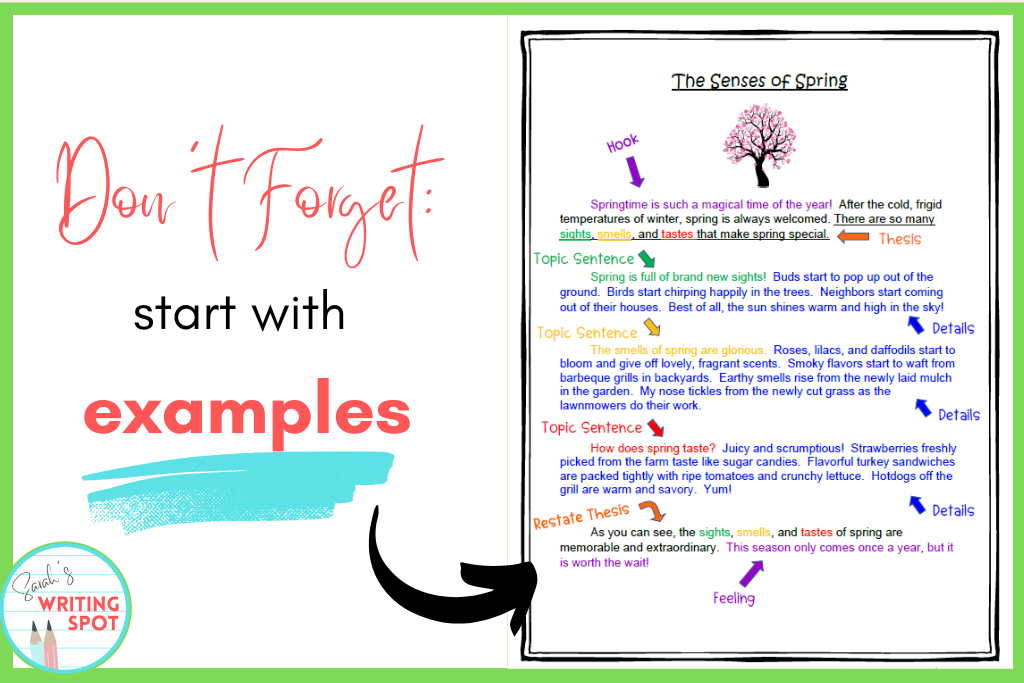
Tip #4: Write with your students.
Show students that you are in the trenches with them. Let them watch you struggle with your thoughts, rewrite your sentences, mess up, and try again. Explain that this is a GOOD thing. Not even the best writers in the world get it perfect the first time. Great writers always strive to make their writing more clear and interesting for their readers.
When you show students you aren’t afraid of failure, they will be more willing to take risks, too.
Tip #5: Embrace revising!
Most students hate this step in the Writing Process. They put so much effort into the rough draft and after that, they are D.O.N.E. “What? You mean I have to go BACK?” they ask.
To avoid making revising such a chore, why don’t you celebrate it instead? Invite students to share their before/after sentences that have been revised. Enthusiastically highlight the amazing transformation these changes made to their writing:
“Wow! I love how you added a hook at the beginning to draw in the reader! Doesn’t that sound so much better?!”
“It’s so awesome how you changed ‘walk’ to ‘ambled’ and then added ‘lazily.’ Bailey ambled lazily to her water bowl is so much more descriptive!”
Once others in the class see all the positive attention and feel-good vibes, they’ll want to make improvements, too!
Tips for Writing Narrative Essays
Let’s switch gears now to some tips for writing narrative essays . Full disclosure: I used to DREAD teaching narrative writing. Being Type A, I much preferred the convenient, organized layout of a 5-paragraph essay. This was my comfort zone. Introduction, 3 Body Paragraphs, Closing. Boom.
But, narrative writing? Not so much. The freestyling ways of storytelling gave me the willies. I even used to try to squeeze my students’ stories into a neat 5-paragraph format. Didn’t work. I just ended up sacrificing their voices.
What have I learned since?:
Tip #6: Frontload lessons on action, feelings, and dialogue.
Before jumping into a freewrite, dedicate a few days beforehand to teach these 3 essential components of narrative writing. Many students already use plenty of action . It’s feelings and dialogue that are often lacking. What can you do about that?
- Provide anchor charts on different character emotions
- Practice using correct dialogue punctuation
- Brainstorm other words than “said”
Practicing these tips will give your students more confidence when it IS time to freewrite.

Tip #7: Brainstorm narrative seeds with small moments.
Is a small moment really that important? Yes! Yes! Yes! Your 4th-5th graders are more mature writers now and they need to practice digging deeper into a small period of time. No more overly-generalized writing pieces about an entire week at the beach. I want to hear about the 5 seconds you got stung by a jellyfish– in detail!
- Model examples of what a small moment looks like and doesn’t look like
- Encourage students to write down examples of small moments in their own lives
Do those moments need to be extraordinary? Not necessarily. I’ve had students write interesting stories about missing the bus or losing a shoe!

Tip #8 : Freewrite the rough draft.
When I teach 5-paragraph essay writing, I generally follow a formulaic pattern. For instance, we make sure the Introduction has a hook and a thesis. The Body Paragraphs have topic sentences and details with transition words. The Closing restates the thesis.
When I teach personal narrative writing, however, we just dive right in. By this time, I’ve already shared numerous narrative examples and we’ve practiced action, feelings, and dialogue. I tell my students to just write their story. Pretend they just sat down with their best friend and can’t wait to tell all about it. You could even have your students tell their story out loud to a classmate first to get the creative juices flowing.
Tip #9: Go back and zing it up!
Revising is one of my favorite steps of the Writing Process. (Can’t you tell? It’s the 2nd time I’ve mentioned it!) It’s a chance to take your writing piece from “meh” to “wowza!” It’s like a game for me. How many adjectives can I add? How many words can I change using the thesaurus? Can I find a place for a fun sound? Watching your piece transform can be magical! (Yes, magical!)
Empower your students with the tools of revising:
- Provide anchor charts with descriptive adjectives, adverbs, and sounds
- Explore the joys of using a thesaurus
- Use a revising checklist so students can improve their own papers
Your students’ papers should be beautifully messy and colorful by the time they’re finished!
Final Thoughts on Essay Writing Tips for Elementary Students
Now, you’re fully armed with practical essay writing tips for elementary students this year. You’ve got a few more tools in your toolbox. Whether you use just two tips…or all nine…you’re still making your way down that path towards better . Keep on groovin’ and makin’ those pencils rock. I’ll be here to cheer you on!
Write on, my Writing Friends!

Looking for more regular advice to keep your writing plans sharp this year? Sign up for monthly freebies, tips, and discounts on new products!
Want your lesson plans written FOR you? Give these a try!
- 5 Paragraph Essay Examples
- Narrative Essay Examples
- 10 Essay Bundle: 5-Paragraph and Narrative Examples
- What is Figurative Language?
Related Articles on Writing Tips for Essays
4 Strategies for Teaching Students How to Revise
15 Topics for Persuasive Essay Writing
Writing and Editing Checklists for Elementary Schoolers
Who is Sarah from Sarah’s Writing Spot?
You may also like...
The best way to use a narrative essay example with growing writers.
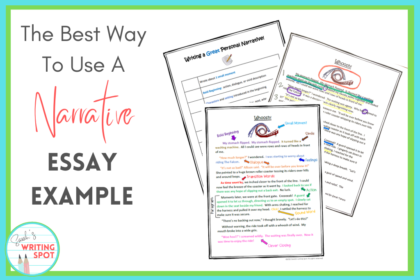
4 Top Tips for Using Dialogue in Narrative Essay Writing
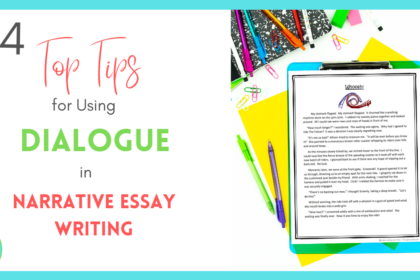
How to Use Inspiring Writing Prompts with Pictures in an Elementary Classroom

5 Simple Essay Writing Steps to Use with Beginning Writers
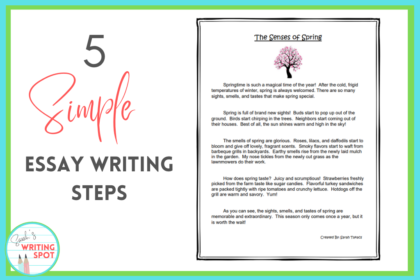
Privacy Overview

IMAGES
COMMENTS
Sep 25, 2024 · Check out this example of good fourth grade opinion writing: • “Zoos should close” Fourth grade writing: informative writing. This year, your child’s informative writing gets more organized, with headers, illustrations and even multimedia components to support specific points. To begin, your child should introduce the topic.
If you are a fourth grade student, you are just beginning to learn about composing an essay. You began writing words and short sentences in kindergarten and first grade, and learned how to combine sentences into a paragraph in second and third grade.
Their writing prompt is how to succeed in the fourth grade. (You can easily modify this lesson for whatever grade you teach.) 4. Introduce the concept of audience. Discuss the audience of the students' essays and what students feel will be important for future fourth graders to know. They are now the fourth-grade experts.
Jan 31, 2024 · Writing is a crucial skill that students must develop from an early age. Students are expected to write more complex sentences and paragraphs as they enter fourth grade. . Teachers and parents play a vital role in supporting students’ writing skills by providing feedback, encouragement, and resour
Jan 23, 2023 · One of my essay writing tips for elementary students includes using small moments for narrative stories. Tip #8: Freewrite the rough draft. When I teach 5-paragraph essay writing, I generally follow a formulaic pattern. For instance, we make sure the Introduction has a hook and a thesis.
Watch this video to see how 4th graders learn to write an essay. Step 2: write, revise and edit.GreatSchools is a nonprofit organization that helps millions ...